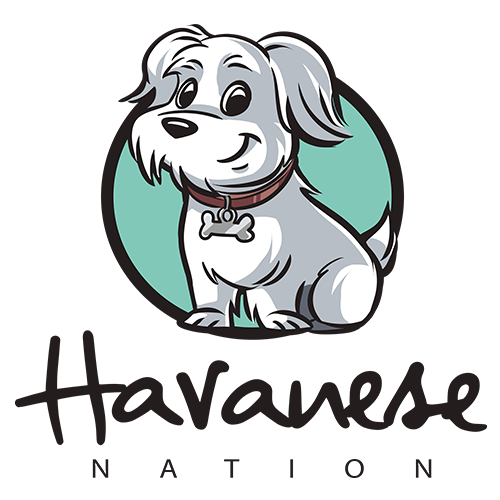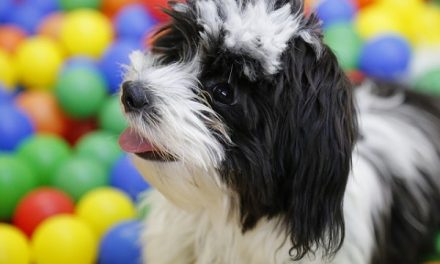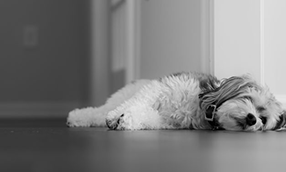The word “aggressive” is a term used more frequently with large breed dogs. However, it is important to remember that small and toy breed dogs can have aggressive temperament traits too.
Luckily, the Havanese dog breed is not one of them. For a toy breed dog, this is the exception rather than the norm. But then again, the Havanese is an exceptional dog as any fan will attest!
Still, it is smart to ask the question “Are Havanese aggressive?” before committing to sharing your life with this dog breed. This is especially wise if you are bringing a Havanese into a home where small children and other potentially vulnerable family pets also live.
If this describes your situation, perhaps the best question to ask is “Do Havanese get aggressive?” Any dog, no matter how people-oriented or friendly, can potentially become aggressive under “perfect storm” conditions.
In this blog post, learn more about the Havanese dog breed personality and temperament, including any tendencies to behave aggressively.
Is the Havanese An Aggressive Breed?
The simple, short and sweet answer to the question of “Is the Havanese an aggressive breed” is, happily, “No!”
The Havanese has a unique breed of history and development. As the sole Cuban-born and bred purebred dog breed registered with the American Kennel Club (AKC), the Havanese breed was literally birthed to sit in the laps of royals.
Not only was the Havanese developed to keep company with royalty, but this dog continues to be the national dog of Cuba to this day.
Suffice it to say Havanese dogs would not have attained this level of human adoration if they were aggressive.
Do Havanese Dogs Make Good Watchdogs?
Having said that, it might seem that a Havanese would be an unlikely choice for the family watchdog. But as a matter of fact, Havanese dogs make excellent watchdogs!
The Havanese as a breed is intelligent, extroverted, alert and extremely loyal. All of these traits have the makings of a great family watchdog. To add to the package, Havanese are not known to be “barkers.”
They will bark from time to time in warning when they feel it is justified, but as a general rule, your Havanese is not going to be crowding the windows barking like a hyena and leaping at every shadow that passes by.
Overall, Havanese dogs are smart but not especially excitable, preferring to win attention with tricks and displays of cuteness rather than vocal outbursts.
What Does True Canine Aggression Look Like?
Regardless of breed, size or background, the first and most important part of detecting true canine aggression is knowing what actual aggression looks, sounds and acts like.
For example, young puppies playing with their mom and littermates may mock-bite, growl, bark, tussle and jump on each other. This is not aggression. This is socialization.
In fact, veterinarians and professional canine behaviorists now believe canine aggression does not arise out of a desire to dominate but rather comes from insecurity or even submissiveness.
Suffice it to say there is much more to be learned about the root cause for canine aggression, but this appears to be a good start.
According to canine behavior experts, canine aggression, in general, tends to display these behavioral hallmarks
– Still, rigid body stance.
– Flattened ears and lowered tail.
– Show of teeth.
– Lunging movements.
– Growling and snarling (a growl with teeth showing).
– Low, guttural bark.
– “Muzzle punching” – think of a fist and then substitute a muzzle.
– Snap biting – a quick bite without full mouth closure.
– Bite that bruises or breaks the skin.
– Rapid series of bites or nips.
– Biting while shaking the head.
These are behaviors Havanese dogs very rarely ever display. But it is always important to remember that some of these aggressive behaviors may come out if your dog feels actively scared or threatened, ends up in harm’s way (such as underfoot) or is deliberately harmed in some way.
Do Havanese Get Aggressive?
It is true that some purebred dog breeds have been specifically bred and developed to work and live in high-intensity situations. The German Shepherd dog breed is a perfect example, and these dogs are in continually high demand to serve in military, police, guard and hunting dog roles for this exact reason.
Such dogs often exhibit abnormally high pain tolerance, a near-absence of fear and an unbreakable focus and concentration.
But these traits do not in any way describe the history, breed origin or development of the Havanese dog breed. The Havanese was bred to sit in laps, entertain people and lightly watch the premises.
So what could possibly trigger aggression in a Havanese?
As mentioned earlier here, any dog breed can potentially become aggressive in the face of the right type of provocation. A dog that feels afraid, threatened, attacked, abandoned, insecure, sickly, injured, starved or otherwise compromised may show aggression that would never appear otherwise.
These are among the most common causes of aggression in the normally lovable, cuddly Havanese.
Boredom and loneliness.
A Havanese that is left alone for hours at a stretch is likely to get bored. Boredom in dogs has often-predictable results – the destruction of home furnishings, inappropriate elimination, barking, acting out and, sometimes, aggression.
When Havanese dogs are left alone on a consistent basis, they will not only become bored but also very lonely. These dogs just do not do well on their own. Over time, a lonely Havanese could potentially become an overly clingy and even aggressive Havanese.
Fear and anxiety.
Insecurity, fearfulness, and anxiety can bring out the worst in anyone, human or canine. Even if your Havanese is not feeling any of these feelings, Havanese breeders report that this dog breed is unusually sensitive to the emotions of “their” people.
This means that if you or someone in your family is consistently angry, sad, anxious, depressed, upset or stressed, your Havanese may begin to act out these emotions and aggression can be one potential result.
The more you can do to positively resolve your own difficulties and challenges, the less likely your Havanese dog’s natural empathy and attunement to you is to turn aggressive (although even here Havanese aggression would be highly unusual).
Illness or injury.
Illness or injury can change any animal’s behavior, especially if there is medication involved. Dogs do not understand the physical or mental changes that often occur with the use of certain medications, including anesthesia for a surgical procedure.
When your Havanese does not feel well or is in an altered state due to injury, illness or medication side effects, it is always smart to proceed with caution. Your dog may perceive a threat where none exists and the potential for acts of aggression will be there as a result.
As long as your dog’s personality and temperament returns to normal once the health issue has resolved, there is nothing to worry about here.
Abuse or neglect.
While dog lovers frequently have trouble understanding this, not every person loves animals in general or canines in particular. Some people feel genuinely afraid of dogs.
Where fear already exists, your Havanese’s small size and loving personality is unlikely to alleviate that fear. This is especially true when the fear arises from memories of past trauma involving dogs. People who are afraid of dogs may perpetuate abuse or neglect, which sets up a vicious cycle even after the dog is rescued from a terrible situation.
Canine aggression related to past abuse or neglect is more likely to occur in rescued dogs, including Havanese. If you decide to adopt a rescue Havanese, always inquire about your new pup’s prior history.
Overly rough play.
While Havanese dogs are the exception in the toy dog breed world and tend to get on extremely well with small children and other household pets, the potential for aggression is always there.
Sometimes small children may not realize when they are being rough during play. For example, pulling on a Havanese dog’s long coat can cause pain. Children often like to play games such as dress up with toy dog breeds, and Havanese generally tolerate this type of play very well.
But if a tiny dog is hurt in play or feels ganged up on or overwhelmed on by a group of children, it would not be out of the realm of possibility to see a Havanese display aggression.
Inadequate training or no training.
Dogs receive initial training during the weaning stage while they are still with their mother and littermates. If a Havanese is removed too soon from the litter, the puppy will miss out on some of this early critical socialization training.
This increases your burden to train your Havanese to display appropriate, well-socialized behaviors. Because Havanese dogs are smart and sensitive and extremely people-oriented, only positive, reward-based training methods should ever be used.
Ultimately, the answer to the question “Are Havanese aggressive?” is “no.” However, now you understand there are circumstances that can lead to canine aggression even in the gentle and loving Havanese breed. With positive training, careful supervision and lots of love, you can ensure your Havanese never feels the need to display aggression.




